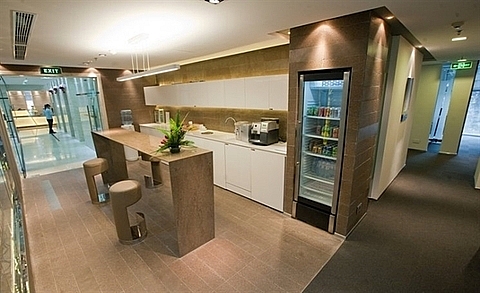Prices of Grade A office space rise due to low supply
 |
| A Grade A office on Ly Thai To Street in Hoan Kiem District. - Photo batdongsan.vn |
Do Thu Hang, director of the Research and Consultancy Department at Savills, Hanoi, said Grade A offices accounted for 28 per cent of the total supply of 1.8 million sq.m2 of office rentals in the city.
Currently, Grade A office rental costs are US$31 per sq.m per month on average. Some offices in the inner city cost $35.
“It is the highest price in seven years,” Hang said, adding that in the high-end office catalogue, Ha Noi ranked fourth in terms of capacity and third in terms of rental prices in the country.
While high-end office space attracts 60 per cent of foreign tenants thanks to strong developments in FDI and M&As in Viet Nam, there are not many options left now. In the inner city, due to limited space for building due to local regulations, many offices are old and lacking modern utilities.
Offices in the Old Quarter were unlikely to be upgraded in the next 10 year, according to Savills, so in Hoan Kiem and Ba Dinh districts, there would continue to be a shortage, so tenants are being forced to move into new areas in the west of Ha Noi.
At the same time, Grade B offices with the highest capacity and occupation rates of 94-95 per cent have remained stable with rental price of $18 per sq.m per month, an increase of 1 per cent per year.
Savills Vietnam stated that co-working spaces were becoming increasingly popular thanks to their flexibility in terms and hiring services. Co-working spaces have attracted a lot of start-up tenants and would draw others looking for offices with a variety of rental solutions.
In Hanoi, co-working spaces are increasingly popular with many different brands such as Regus, Up, Toong, Cogo, Tiktak, CEO Suite, Dreamplex and WeWork.
Over the past twelve months, Up has opened four new locations with a total size of about 15,500 sq.m; Toong has opened three new locations covering about 7,000 sq.m. and Cogo has also opened five new facilities with a total area of about 11,500 sq.m..
According to Savills, innovation in real estate had continued after realty technology (Proptech) started to attract up to $1 billion per month globally.
What the stars mean:
★ Poor ★ ★ Promising ★★★ Good ★★★★ Very good ★★★★★ Exceptional
 Tag:
Tag:
Related Contents
Latest News
More News
- Saigon Centre gains LEED platinum and gold certifications (February 12, 2026 | 16:37)
- Construction firms poised for growth on public investment and capital market support (February 11, 2026 | 11:38)
- Mitsubishi acquires Thuan An 1 residential development from PDR (February 09, 2026 | 08:00)
- Frasers Property and GELEX Infrastructure propose new joint venture (February 07, 2026 | 15:00)
- Sun Group led consortium selected as investor for new urban area (February 06, 2026 | 15:20)
- Vietnam breaks into Top 10 countries and regions for LEED outside the US (February 05, 2026 | 17:56)
- Fairmont opens first Vietnam property in Hanoi (February 04, 2026 | 16:09)
- Real estate investment trusts pivotal for long-term success (February 02, 2026 | 11:09)
- Dong Nai experiences shifting expectations and new industrial cycle (January 28, 2026 | 09:00)
- An Phat 5 Industrial Park targets ESG-driven investors in Hai Phong (January 26, 2026 | 08:30)























 Mobile Version
Mobile Version